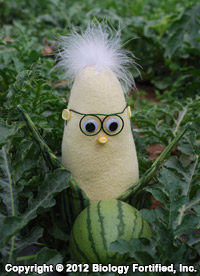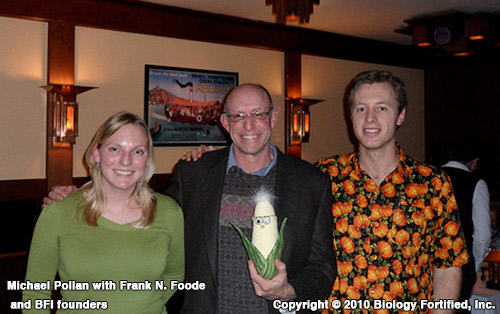Submitted by Rebekah Wilce on
Three years ago, CMD reported on Karden -- an adorable puppet used in part to convince kids that gardening with sewage sludge was a fun activity for all ages. (Karden, of course, failed to explain to the kiddos that sewage sludge extracted from city waste supplies can contain toxic and hazardous materials.)
Well, move over Karden the sludge puppet, there's a new toy in town! Frank N. Foode is "your friendly neighborhood genetically modified organism," who helps "make the science of biotechnology fun and approachable."
This ear of corn sprouted eyes, white hair, and spectacles. The "cutest corn plush" is the mascot of Biology Fortified, Inc., a new small non-profit group based in Middleton, Wisconsin that promotes genetically modified organisms (GMOs) and is responsible for the Biofortified blog.
 "Few are able to resist getting their photo taken with" Frank, the group gushes -- including "the late Senator George McGovern, food writer Michael Pollan, Secretary of Agriculture Tom Vilsack," and more.
"Few are able to resist getting their photo taken with" Frank, the group gushes -- including "the late Senator George McGovern, food writer Michael Pollan, Secretary of Agriculture Tom Vilsack," and more.
But don't worry! Frank "does not endorse products, least of all genetically engineered food products," the group claims. Just GMOs and the science of GMOs in general!
Not content to be alone in his travels around the world, getting photographed with a random assortment of academics and luminaries, a recent fully-funded Kickstarter campaign now makes multiple plush "lovable Frank"s -- in other forms, branching out from GMO corn to GMO papaya and the opportunity to "adopt-a-crop" and pick a new GMO design (an opportunity not taken by anyone to date) -- available to his adoring fans (all 210 backers).
And hey, Frank even tweets!
Frankly, My Dear...
According to Biology Fortified, Inc.:
"The science behind genetically engineered foods is complicated, and often difficult for people to understand. Some people who think that these foods are strange, dangerous, or monstrous call them 'frankenfoods' rather than try to understand them. At the same time many other foods that we commonly eat are themselves very strange in their own right -- often even more strange than the changes made through genetic engineering. So we named our mascot Frank N. Foode™ to make light of it all! Our hope is that this fun character can help get people interested to learn and think about the issues surrounding plant genetics and agriculture, and give people a personality who they can follow around the world."
Jonathan Latham, co-founder and executive director of the Bioscience Resource Project and editor of Independent Science News, holds degrees in crop genetics and virology. He was a postdoctoral research associate in the Department of Genetics, University of Wisconsin, Madison -- where Biology Fortified co-founder, Karl Haro von Mogel, is a PhD candidate. But Latham is no fan of Biology Fortified's work. Latham told CMD, "They pose as pro-science but what they really offer is uncritical parroting of corporate talking points. They also deploy classic PR tactics. Whenever a real food safety issue occurs, or whenever a critical article about biotechnology is getting attention online, they try to derail legitimate discussion with red herrings."
 While there are undoubtedly those who call GMOs "frankenfoods," many critics focus on the "pesticide treadmill" that the most commonly grown and sold GMOs -- "Roundup Ready" herbicide-resistant crops and those with the pesticide Bt built in -- perpetuate, as CMD has reported. This critique appears to have only been addressed in passing by the Biofortified blog, which simply notes that the issue of pesticide proliferation also "applies to non-breeding strategies including chemical insecticides and biological control agents," a point which critics of GMOs also make, as CMD has reported.
While there are undoubtedly those who call GMOs "frankenfoods," many critics focus on the "pesticide treadmill" that the most commonly grown and sold GMOs -- "Roundup Ready" herbicide-resistant crops and those with the pesticide Bt built in -- perpetuate, as CMD has reported. This critique appears to have only been addressed in passing by the Biofortified blog, which simply notes that the issue of pesticide proliferation also "applies to non-breeding strategies including chemical insecticides and biological control agents," a point which critics of GMOs also make, as CMD has reported.
Other GMO critics are concerned about cross-contamination with non-GMO crops and weeds, creating herbicide-resistant weeds. But one of the Biofortified blog posts that addresses this concern calls "genetic contamination" an "emotional term" and not only completely ignores the issue of weeds becoming resistant to Roundup® glyphosate herbicide, but also ignores the contamination of food, such as the 2000 contamination of corn with GMO StarLink™ corn that led to a huge recall of Taco Bell taco shells. The U.S. Environmental Protection Agency (EPA) had registered the GMO corn variety for commercial use for livestock feed and industrial use only because it was judged to be "potentially allergenic ... in human food." Numerous other blogs on the site do discuss glyphosate.
Friends of Frank
Frank and friends have also produced a auto-tuning video of scientist Norman Borlaug, father of the "Green Revolution," an effort during the 1940s through the 1970s to increase world food production, particularly in poor countries such as Mexico, India, Pakistan, and the Philippines, through crop breeding and the increased use of fertilizer, pesticides, and irrigation. While the Green Revolution led to increased food production, many criticize it for creating social, economic, and environmental problems. The development and use of GMOs in food production has been called the "second green revolution."
Frank and his friends have some powerful fans. This video is being promoted on Twitter by CropLife International, a trade association containing all of the "Big 6" pesticide and GMO corporations -- Monsanto, BASF, Bayer, Dupont, Dow Chemical Company, and Syngenta -- some of the biggest companies in the world. CropLife America is an active member of the American Legislative Exchange Council (ALEC) and its Energy, Environment, and Agriculture Task Force.
Frank is also a friend of Jon Entine, founding executive director of the Genetic Literacy Project and one of the GMO and pesticide industry's favorite PR tools. He wrote his 2011 Scared to Death: How Chemophobia Threatens Public Health for the American Council on Science and Health. ACSH requested $100,000 in funding for the book project from the GMO and pesticide corporation Syngenta as part of the company's PR campaign around its weed-killer atrazine, which was the subject of a major lawsuit, as CMD has reported. ACSH also receives regular operating support from Syngenta, which the email pitch called the organization's "lifeblood."
Frank's creator, Karl Haro von Mogel, recently met up with Entine in Puna, Hawai'i on their way to meet Dr. Dennis Gonsalves, the developer of GMO papayas. von Mogel wrote a gushing blog on his trip: "In Dennis, I had met the highest concentration of Aloha yet on the entire trip. If he were a plant, his leaves and roots exuded Aloha into the surrounding air and soil. It was infectious," before planting Frank in the papaya fields for a photo op. The two had presented together previously at a June 2013 GMO panel organized by the Cato Institute. And Entine has mentioned von Mogel in articles published in Forbes and elsewhere at least four times in recent months.
Entine's and von Mogel's primary organizations -- Genetic Literacy Project and Biology Fortified, Inc., respectively -- both claim not to accept corporate funding.
Too Early for April Fool's
The campaign to mass produce Frank the mascot is "so grotesque and over the top that it must be an April Fool's joke," says one campaigner for GMO testing and labeling. But the campaign is too early for April Fool's day, and may be too late to sway public opinion.
The American public has decided that, despite the platitudes of GMO promoters, eaters have the right to know when food contains GMOs (as an estimated 80 percent of the food supply in the United States does). The movement to require GMO labels in the United States -- as the European Union already does -- enjoyed support from 93 percent of respondents in a 2013 New York Times poll. So far in 2014, 67 GMO labeling bills have been introduced in 25 states, according to the National Conference of State Legislators. Additional bills are pending in California, Minnesota, Missouri, and Rhode Island; and campaigns in Arizona, Colorado, Florida, Hawaii, and Oregon work to put the question on the ballot for state voters.
-------
This article has been updated with four clarifications. First, the original version of this article suggested that some of the notable people photographed with the plush toy were "confused," although as the toy's creator, Karl Haro von Mogel, noted that individuals photographed knowingly posed with the toy even if they may not all endorse GMOs. Second, the article has been clarified to make clear that the discussion of a blog suggesting that cross-contamination was an "emotional term" but not mentioning high-profile instances of cross-contamination was referring only to "that" blog and not the blog site as a whole. Mr. Haro von Mogel has noted that numerous other blogs on his site discuss Roundup or weed resistance -- even though the older StarLink controversy is rarely mentioned. He also notes that StarLink was not an issue of "genetic" contamination but involved GMO corn permitted for consumption by livestock being used impermissibly for human food. Third, the article has been clarified to make even clearer that Mr. Haro von Mogel's blog was gushing about his meeting with Dennis Gonsalves and not with Jon Entine. Finally, the article has been clarified to make clear that even though Norman Borlaug's words are often used to support GMOs, the video itself contains no reference to GMOs and contains only the controversial scientist's own words. We regret any confusion caused by the need to clarify these matters and apologize for any misunderstanding the original article may have caused. In addition, we have offered Mr. Haro von Mogel the opportunity to post a response to this article in the comments below.

Comments
Louis Luetzgendorff replied on Permalink
anti-GMO
Alex T replied on Permalink
Blind spot
don replied on Permalink
Where do these comments come from?
luetzgendorff replied on Permalink
Where do your comments come from?
Amelia J. replied on Permalink
The corrections added to this
Selma replied on Permalink
skeptical
Pages